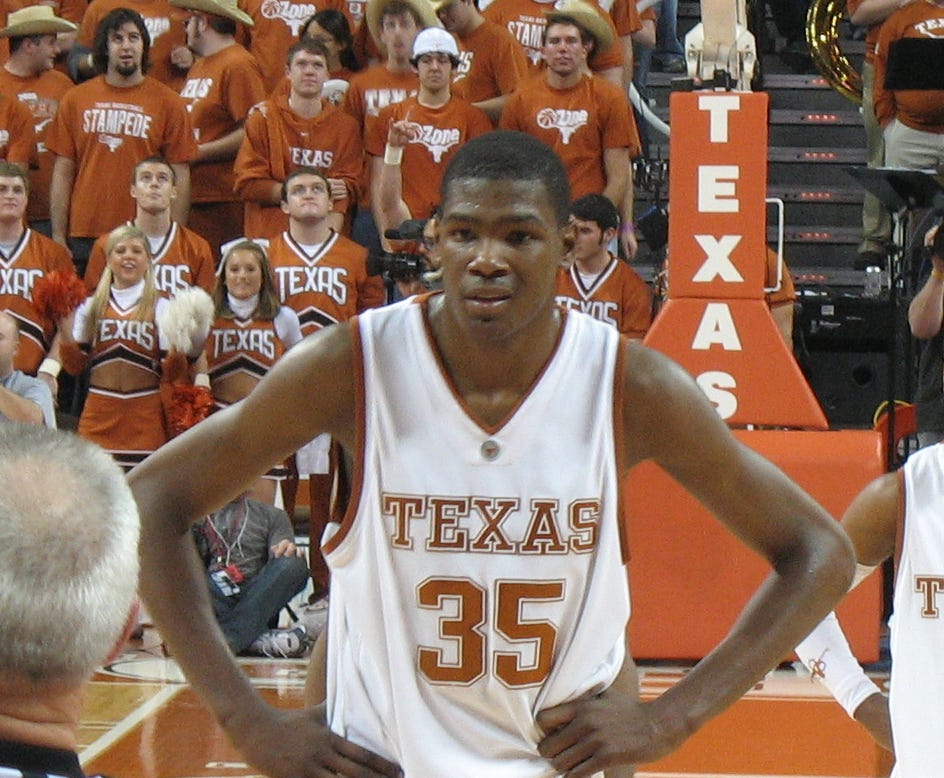Kevin Durant is such a talented basketball player that he makes any team he's on significantly better. Whether the team is one backed by terrific organizational culture with great leadership or one so dysfunctional that they'd make the Washington Generals look like the Dream Team, Kevin Durant improves your win/loss record every time. He's just that good. That's why NBA general managers are constantly trying to identify and draft the next Kevin Durant. When I talk to clients who have open positions on their team they're often trying to do the same thing: find someone so incredibly exceptional that they'll transcend any organizational dysfunction and inescapably make the team much better.
Putting my hyperbolic SEO-grabbing newsletter title aside (sorry), allow me to contradict myself: If you can find and hire a Kevin Durant, you should absolutely, unequivocally hire them.
The problem is that there are only a handful of Kevin Durants out there. And while there might be more Kevin Durant-types in your line of work than in the NBA, you have other challenges: a) you'll struggle to distinguish the real Kevin Durants from the Hasheem Thabeets; b) you probably can't afford a real Kevin Durant unless you have exceptional financial resources; and c) your hiring timeline and process may not sync up with when the Kevin Durant (who you've luckily managed to identify and can afford) is able to join your team.
The truth is, you probably aren't going to find a Kevin Durant. You should still try! But your backup plan shouldn't be to hire a lesser player, it should be to build a better franchise.
The common pitfall many organizations tumble into is this relentless pursuit of the elusive all-star for a pivotal role. It's not that you shouldn't want an all-star, rather it's recognizing that the making of most all-stars often depends more on the ensemble around them than on their standalone, context-independent abilities.
But be careful: acknowledging that the team around someone is often what makes them an all-star is not a clarion call to "hire for fit" over talent. As I've emphasized in the past, hiring for fit can often be a misguided approach, a crutch that organizations lean on that leads to biases and hiring paralysis.
Instead, the emphasis should be on building a robust team culture that can incorporate "good enough" talent and elevate them to greatness. Hiring managers would do well to shift a significant focus of their energy from the perfection of the would-be hire and more onto the team they’ll be asked to fit in with.
And creating a harmonious blend between the organization's ethos and the incoming talent's potential is not only more likely to take your actual new hire and turn them into an all-star, it’s also a much more weatherproof talent strategy. Much like the actual NBA, talent moves around far more today than it did at the time when your current hiring processes and requirements were likely first created. Jobs are easier to find across geographies and roles change with extreme frequency. It’s simply not prudent for people to be as loyal to organizations as they once were. So rather than finding a context-independent superstar, focusing on how to optimize whomever you do hire is a far more sustainable approach.
Returning to hoops-land (it’s August… can you tell that I’m eager for the season to start again?), the perfect example of this is Kevin Durant's former teammate at the Golden State Warriors, Draymond Green. Draymond was certainly a talented college player, leading Michigan State to the NCAA Final Four, but entering the NBA he was not a surefire superstar like Kevin Durant. Undersized for his traditional position and not a great shooter, Green fell into the second round of the NBA draft and was selected 35th overall. Today, he’s a multi-time all-star and will eventually make the NBA Hall of Fame. But this is not because Green was secretly an athletic talent the likes of Michael Jordan. It was because the Golden State Warriors focused more on equipping their organization to allow his unique skills to flourish.
To some extent, one could argue that they did the same for Green’s teammate, Stephen Curry. Curry had more pure talent than Green, but his smaller stature prevented him from being a guaranteed superstar like Durant or LeBron James. The Warriors built an organization that discovered how to unleash Curry’s capabilities and enabled him to flourish as the greatest shooter of all time and one of the 10 best players to ever play.
While the allure of finding the next Kevin Durant in the hiring process is undeniable, it's far more sustainable and pragmatic to channel effort into creating an environment that nurtures the Draymond Greens of the professional world. One way to do this better is to utilize advanced psychometric personality assessments in your hiring process; not just for identifying those with a predisposition for success, but instead focusing on how you can best incorporate this person given what the assessments tell you about who they are. So while you’re out there searching for Kevin Durant, don’t forget to give comparable energy to the team they’ll one day be joining. That will probably make or break the success of the hire more than anything.




